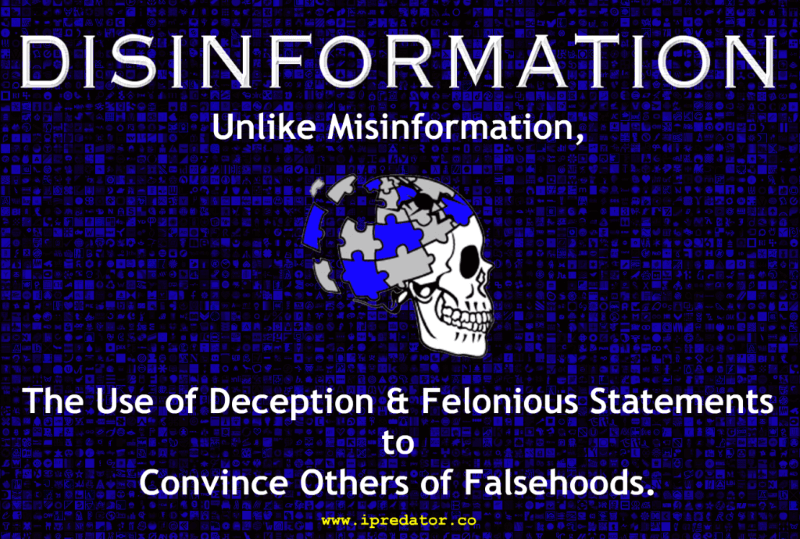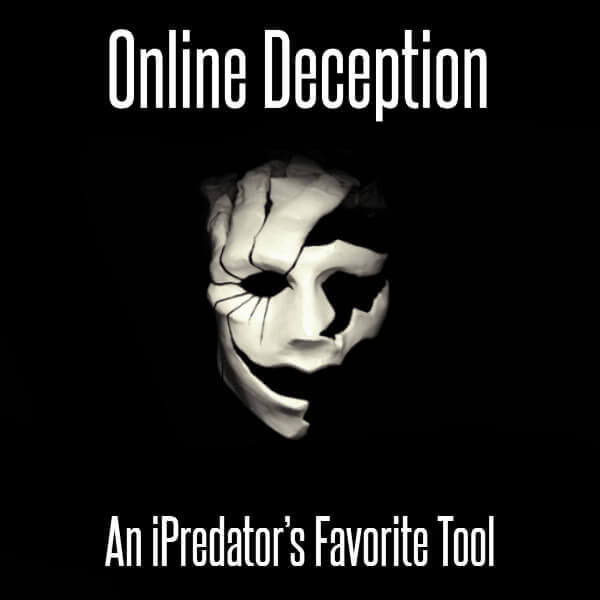Deception Online
for
Power, Control and Financial Gain
(2014/2024)
Online Deception [aka, Digital Deception, Internet Deception, Cyber Deception] is the use of Information and Communications Technology to deceive other online users usually rooted in malevolent, nefarious or covert online activities. Although primarily used for anti-social purposes, online deception tactics are occasionally designed for benevolent purposes, such as, when law enforcement design felonious profiles of children used to locate, identify and arrest online sexual predators. The art & science of online deception is used by all iPredator typologies including cyberbullies, cyberstalkers, cyber criminals, cyber terrorist, cyber harassers, internet trolls and online sexual predators.
“Unlike traditional human predators prior to the Information Age, iPredators rely on the multitude of benefits offered by Information and Communications Technology. These assistances include exchange of information over long distances, rapidity of information exchanged and the seemingly infinite access to the data available.” Michael Nuccitelli (2012)

Q & A Online Deception
I. Why are online users easily deceived? Having spent a great deal of time creating the dark side of human consciousness concept, iPredator, this writer spent many hours endeavoring to answer the question of why online users are so easily deceived online. In the most concise way to answer this quandary, one must first understand that humanity is enraptured by the novelty and awe of a new societal paradigm called the Information Age.
It is this point in time, in the evolution of human civilization, where information technology and the electronic universe of cyberspace has become part of the metaphorical fabric influencing many interpersonal relationships and aspects of daily life functioning. It cannot be denied that present day society is at the beginning of a new technological frontier that is paradoxically sensory magnificent and unchartered territory. Within these unknown aspects of the Information Age, temptation and curiosity act as accelerants driving online users to deceive their peers.
Cyberspace and the “veil of anonymity” it affords all online users is a temptation few can resist. The practice of deception has been part of the human experience since the beginning of civilization. The reason it continues to this very day is because it is part of what it means to be fallible, and insecure human beings. Whether one subscribes to evolutionary biology or a religious dogma, the practice of deception is innate to all humans. Not just in humans, but in most living organisms that must practice stealth and camouflage to survive, flourish and reproduce.
Many people are easily deceived online because they stubbornly want to believe what they see, hear and read online is real, attainable and without consequences. Even though information technology is still in its infancy within the evolution of human civilization, many people still forgo their innate instincts of skepticism and self-preservation. Instead, they replace these survival traits with what they believe is an opportunity waiting to be embraced. Unfortunately, in cyberspace, an opportunity, turns out to be “a wolf in sheep’s clothing”.
II. Does not having access to someone’s physical expression [i.e., body language, non-verbal communication, etc.] contribute to online deception gullibility? There is some merit supporting the argument that cyberspace, information technology and virtual reality hampers an online user’s ability to access and rely upon their physical, psychological and intuitive senses. Although this writer agrees cyberspace and online interpersonal dynamics, without physical evidence of intent, contributes to a reduction in accurately making conclusions about another person’s modus operandi, this writer does not believe it is a major cause. This writer does not believe having fewer sensory tools causes online users to become more susceptible to online user misinterpretations and increased gullibility to online deception.

III. What are some surprising ways an online user can be conned online? Having spent the last 5 years obsessed with learning about the Darkside of Cyberspace and how to stop online users from engaging in malevolent and nefarious activities, there is little left in what this writer would categorize as surprising in the realm of conning online users. Prior to changing career paths to focusing on developing what this writer hopes one day becomes the field of Cybercriminal Psychology, this writer was a full-time practicing psychologist and forensic evaluator. In both those realms, there were patient and forensic cases this writer found surprising. Not in the sense of surprising as being novel and creative, but surprising in how some would harm their loved ones, peers and community associates without merit.
It is the same now in my present career trajectory. What is most surprising living in the Information Age, are not the perpetrators, but the targets of their criminal, deceptive and deviant tactics. This writer is amazed by how few online users, parents, businesses and organizations take the time to learn basic cyber-attack prevention measures. There is nothing surprising about the ever-growing multitude of new malware, spyware, viruses, bots and hacking programs.
What is surprising, if not amazing, is that few people take the time to learn simple strategies to insulate themselves, their loved ones and businesses from cyber-attacks. One does not have to have a graduate degree in technology to learn how to reduce the chances of being conned online or victimized.
IV. How can an online user make sure they do not fall victim to online deception? This writer cannot emphasize enough but refraining from disclosing personal information is the number one recommendation to prevent being conned online. For some, like celebrities, public figures and those in the community spotlight, they have a harder time restricting their personal information because they are consistently under the public’s proverbial microscope. Although this is a reality for anyone who has the attention of the masses, measures still can be implemented to significantly reduce the chances of being targeted.
For those not in the public spotlight, it is the same internet safety recommendation. The less personal information disseminated and exchanged online, the lower the probability is of being attacked or approached by online con artists. Lastly, and equally as important to personal information restrictions is the acronym ODDOR. During the development of the iPredator construct, this writer was hit with an epiphany that can reduce an online user’s chances of being targeted. The concept being mentioned is ODDOR or Offline Distress Dictates Online Response. This writer strongly believes that a child and adult’s offline stressors directly impacts their online demeanor, choices and responses to other online users.
If an online user is experiencing heightened stress due to familial, relationship, financial or any other types of life stressors, they are much more likely to be conned, flattered and manipulated by those who are trolling cyberspace for vulnerable targets. If an online user makes it a habit to take 60 seconds each time, before going online to assess their level of ODDOR, they are far less likely to behave in ways that online con artists, cyberstalkers, trolls and cybercriminals look for when searching for their next target.
V. What is Cyberstealth? Cyberstealth is a concept formulated along with iPredator and is a term used to define a method and/or strategy by which iPredators use Information and Communications Technology (ICT) , if they so choose, to establish and sustain complete anonymity while they troll and stalk a target. Cyberstealth is a methodology entrenched in Information Age Deception or also called cyber deception. Given the internet inherently affords everyone anonymity, Cyberstealth, used by iPredators, range from negligible to overly complex and multi-faceted. The rationale for using “stealth” in the suffix of this term, serves to remind ICT users the primary intent fueling iPredators. This intent is to hide their identity by designing false online profiles, identities, covert tactics and methods to ensure their identities remain concealed reducing their probability of identification, apprehension and punishment.
Unlike classic deception, used by traditional criminals and deviants, online deception relies on the anonymity and “veil of invisibility” available to all ICT users. The primary difference between Information Age deception and Cyberstealth are the activities iPredators and ICT users engage in. In this writer’s construct, Cyberstealth is reserved for iPredators who actively plan a strategy that have criminal, deviant and harmful implications to targeted victims. Information Age deception includes all forms of Cyberstealth, but also includes deceptive practices that do not have elements of crime, defiance or harm against others.
Cyberstealth is a covert method by which iPredators can establish and sustain complete anonymity while they engage in ICT activities planning their next assault, investigating innovative surveillance technologies or researching the social profiles of their next target. When profiling or investigating an iPredator, their level of Cyberstealth complexity, digital footprint, victim preferences, ICT skills and behavioral patterns are used to identify who they are.

VI. What is iPredator? iPredator: A person, group or nation who, directly or indirectly, engages in exploitation, victimization, coercion, stalking, theft or disparagement of others using Information and Communications Technology (ICT). iPredators are driven by deviant fantasies, desires for power and control, retribution, religious fanaticism, political reprisal, psychiatric illness, perceptual distortions, peer acceptance or personal and financial gain. iPredators can be any age or gender and are not bound by economic status, race, religion or national heritage.
iPredator is a global term used to distinguish anyone who engages in criminal, coercive, deviant or abusive behaviors using ICT. Central to the construct is the premise that Information Age criminals, deviants and the violently disturbed are psychopathological classifications new to humanity. Whether the offender is a cyberbully, cyberstalker, cyber harasser, cybercriminal, online sexual predator, cyber terrorist or engaged in internet defamation or nefarious cyber deception, they fall within the scope of iPredator. The three criteria used to define an iPredator include:
- I. A self-awareness of causing harm to others, directly or indirectly, using ICT.
- II. The usage of ICT to obtain, tamper with, exchange and deliver harmful information.
- III. A general understanding of Cyberstealth used to engage in criminal or deviant activities or to profile, identify, locate, stalk and engage a target.
Unlike human predators prior to the Information Age, iPredators rely on the multitude of benefits offered by Information and Communications Technology (ICT). These assistances include exchange of information over long distances, rapidity of information exchanged and the infinite access to data available. Malevolent in intent, iPredators rely on their capacity to deceive others using ICT in the abstract and artificial electronic universe known as cyberspace. Therefore, as the internet naturally offers all ICT users anonymity, if they decide, iPredators actively design online profiles and diversionary tactics to remain undetected and untraceable.
Cyberstealth, a sub-tenet of iPredator, is a covert method by which iPredators attempt to establish and sustain complete anonymity while they engage in ICT activities planning their next assault, investigating innovative surveillance technologies or researching the social profiles of their next target. Concurrent with the concept of Cyberstealth is iPredator Victim Intuition (IVI). An iPredator’s IVI is their aptitude to sense a target’s ODDOR (Offline Distress Dictates Online Response), online & offline vulnerabilities, psychological weaknesses and technological limitations increasing their success of a cyber-attack with minimal ramifications.

Connection vs. Disconnection
“The Information Age technocentric concept of being “connected” is actually a paradox of disconnection causing us to lose our instinctual drives for social cohesion, allegiance and selflessness. As our dependency upon Information and Communications Technology [ICT] grows metastasizing throughout our collective human consciousness, the less we care for our neighbors and the more we delude ourselves into thinking that online connections are far more valuable than realty-based relationships.” Michael Nuccitelli
Michael Nuccitelli, Psy.D.
Michael Nuccitelli, Psy.D. is a NYS licensed psychologist, cyberpsychology researcher and online safety educator. In 2009, Dr. Nuccitelli finalized his dark side of cyberspace concept called iPredator. Since 2010, he has advised those seeking information about cyberbullying, cyberstalking, cybercriminal minds, internet addiction and his Dark Psychology concept. By day Dr. Nuccitelli is a practicing psychologist, clinical supervisor and owner of MN Psychological Services, PLLC. After work and on the weekends, he volunteers helping online users who have been cyber-attacked. Dr. Nuccitelli’s is always available to interested parties and the media at no cost. This website and everything created by Dr. Nuccitelli is educational, free and public domain.

